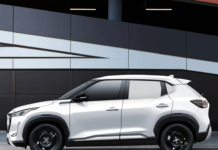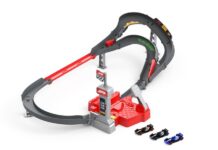PRETORIA, South Africa, 30 May 2017 – Hands up, who likes forking out cash to fill up at the fuel station? What if you could do that less often? Where would you turn for help?
Try turning to the mirror, because poor driving habits are just like pouring money down the drain. As consumers buy fuel efficient vehicles in record numbers to save money and benefit the environment, few know that good driving habits are really the best way to economise.
Ford studies have investigated the influence of driving style on fuel consumption and CO2 per kilometre driven and found that by adopting an eco-driving style, drivers can slash both their fuel bill and their emissions by as much as 25 per cent compared with ‘normal-average’ driving behaviour. Small changes to the way you drive can have a big impact on fuel economy.
“Practicing eco-driving is a great way of reducing fuel consumption, saving money in the process,” said Ziad Dallalah, chief resident engineer, Ford Middle East and Africa. “And while preserving fuel is of great benefit to the pocket, the bigger picture is its impact on the environment. Less fuel burned equals less CO2 produced, and that’s something we all profit from.”
Here are some simple tips that can help you be a greener, more fuel efficient driver.
Drive smoothly
Aggressive driving such as rapid acceleration, speeding and braking can lower your fuel mileage significantly. So accelerate smoothly, brake softer and earlier, and stay in one lane while it’s safe to do so. Not only do these driving techniques save fuel, they can prolong the life of your brakes and tires.
Slow down
Speeding wastes lots of fuel. By driving 90 km/h instead of 100 km/h you can improve your fuel efficiency by up to 10-15 per cent. Also, aim for a constant speed. Pumping the accelerator sends more fuel into the engine, emptying the tank faster. Using cruise control whenever possible on the highway helps maintain speed and conserve fuel.
No idling
Today’s engines don’t need a warm up. Start the car immediately and gently drive away. Don’t leave your car idling. Prolonged idling increases emissions and wastes fuel. Turn the engine off whenever it is safe to do so, such as when stationary for more than 30 seconds. This avoids unnecessary energy consumption of an idle running engine.
Remove unnecessary cargo
Reducing the amount of cargo you keep in your trunk or back seat can improve your fuel efficiency as less energy is needed for acceleration. Try to travel as light as possible, keep only the most important items (like an emergency kit, jumper cables, a small toolset, and a small jack) in the vehicle.

Reduce aerodynamic drag
Your vehicle is designed for good aerodynamics – but attaching a huge carrier or bike to the roof adds more wind resistance. If you spend lots of time on the highway or are planning a long trip, try to transport extra items inside the vehicle or attached to the rear. Keeping your windows and sunroof closed can lower wind resistance too. You will have less drag, and better fuel economy.
Only use A/C on the highway
Your fuel economy drops by up to 15 per cent when you use the air conditioner at low speeds. So if it isn’t too hot, turn off the air conditioner when driving around town, and roll down your windows instead. However, at 90 km/h or higher, using the air conditioner is preferable to open windows for two reasons: Your vehicle has much lower wind resistance with the windows closed. And because the engine produces more power at higher revs, it’s able to run accessories like the A/C compressor more efficiently.
Use cruise control
Activating your cruise control keeps you from mindlessly driving faster and with lower fuel efficiency, maintains a constant speed, and won’t use additional fuel while accelerating. Try to set your cruise control at your vehicle’s most fuel-efficient speed, as long as it’s at or below the legal limit.
Combine trips
Many short trips will use more fuel than a single, longer trip. So when you have to drive for errands, get as many accomplished as you can in one trip to maximise your fuel economy.
Watch Ford’s ‘How to save money on fuel’ video here:
Fuel efficiency maintenance tips
How you take care of your vehicle can also have a big effect on how much fuel you use. By maintaining your car in peak condition you can keep more money in your wallet.
Keep your engine tuned
Fixing a vehicle that is noticeably out of tune or has failed an emissions test can improve fuel economy by an average of four per cent. But here’s the real bonus: Replacing a malfunctioning oxygen sensor can improve your mileage by as much as 40 per cent.
Keep your tyres properly inflated
Properly inflated tyres are safer, handle better, last longer, and get better fuel economy. The operating vehicle tyre inflation pressure can be found on a certification label, usually located on the driver’s door, a door pillar or the glove box. Just be careful not to exceed the operating tyre pressure either, because overinflating tyres reduces their performance in terms of traction and lifespan.
Use the recommended grade of motor oil
Following the manufacturer’s recommended grade of motor oil in your Owner’s Guide will keep your engine’s lubrication system working as efficiently as possible. Using the wrong grade of oil can drop your fuel economy by up to two per cent.
All the little things can add up
The technicians at your local Ford dealership are trained to optimise your fuel economy. Along with the above-mentioned maintenance, they can change worn fuel filters and spark plugs, perform wheel alignments, and inspect your exhaust and emissions systems. Together, all of these vehicle maintenance procedures and driving behaviours can improve your mileage by up to 25 per cent.
Of course, the vehicle itself can also make a big different, and Ford goes further by offering customers the power of choice, from improving the fuel efficiency of its current vehicle line up to investing in electrified vehicles, alternative fuel options and advanced technologies that can benefit millions of people. Today, Ford’s award-winning EcoBoost engine technology delivers outstanding performance and significantly better fuel efficiency.






























